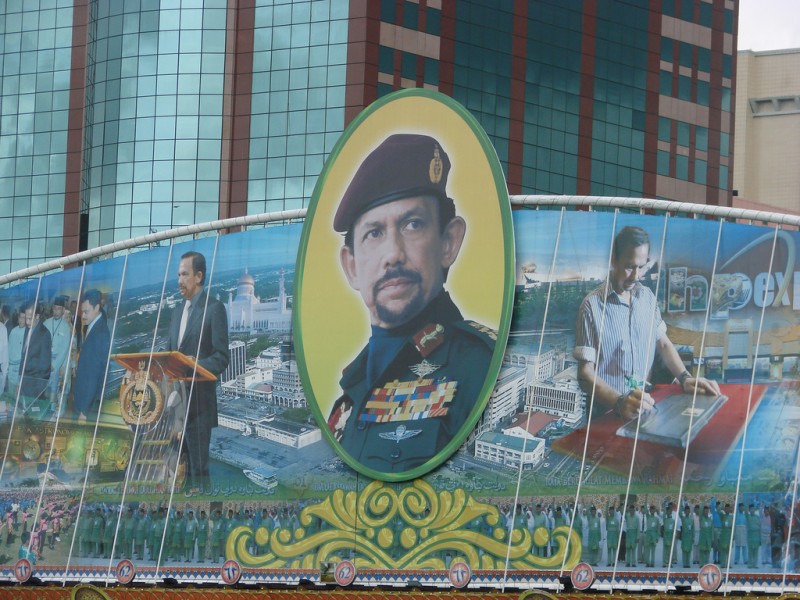 [1]
[1]Brunei is ruled by a powerful Sultan who is also one of the richest men in the world. Flickr photo by watchsmart (CC License)
Brunei is a Muslim-majority country. It is a monarchy where the Sultan is also the Prime Minister and wields absolute power in the government and in Brunei society. The Sultan is also one of the wealthiest people in the world.
Brunei netizens initially reacted strongly against the Sharia Law but opposing voices became silent after the Sultan warned [3] online critics that they can be prosecuted for undermining the law.
The controversy became an opportunity to review the state of media freedom and free speech in the country. Some Brunei bloggers actually did this and they called for better criticism of social policies to promote accountability and good governance.
We should start with the basic issue: Is there media freedom in Brunei? Quratul-Ain Bandial has written [4] an article for The Brunei Times highlighting the many issues facing Brunei’s mainstream media. According to the author, there is no censorship board in the country but self-censorship is being practiced:
There is no censorship board in Brunei that systematically vets what we publish, yet we live in constant fear. Fear of overstepping the invisible line in the sand that defines what we can or cannot say.
Mainstream editors are afraid to antagonize authorities:
Officials chastise us for portraying the country in a negative light, or reporting on things deemed “sensitive”.
And more often than not, editors would rather not take the risk of publishing something that might anger or offend the authorities. Under Brunei law, the government has the power to arbitrarily shut down media outlets and journalists can be jailed for up to three years for reporting “false and malicious” news.
Journalists are “reduced to becoming merely stenographers for government officials”:
Most news in Brunei is confined to event-based reporting, produced by covering the opening ceremony of this government programme or that ministry's housing scheme, without deeper investigation into underlying issues.
And that is all we are doing — merely reporting and not journalism. We are reduced to becoming merely stenographers for government officials, without getting the other side of the story.
The author reminded other journalists that this practice is a disservice to the public:
At this point, I would have to say we are failing the public in this respect. In the absence of free discussions and alternative viewpoints, there are no checks and balances on power, which is dangerous for anyone's future.
With mainstream media unwilling to report alternative views, many Bruneians have used the Internet to express their thoughts and to read dissenting opinions:
The Internet has become the town hall of the Bruneian community, with unrestricted access to content allowing people to air their views freely through online news sites, blogs and forums.
Meanwhile, writer Hazirah also noted [5] that criticism is aired through ‘non-official’ sites like the Internet:
There is a culture in Brunei around criticism that has puzzled and frustrated me. The local media is not very critical – or not openly so. And because open criticism does not appear in the media, it is instead carried out in mostly “non-official” capacity.
But she also observed that many people, even those who are active online, refuse to be critical of the government:
There is a notion that the government, a potential target of criticism, cannot be criticised…It seems flawed to suggest that we cannot criticise the government.
She argued that criticism is required to help government official perform their job better:
People working in the government have made mistakes while designing systems or writing policies. They sometimes lacked insight, or asked too few people for feedback.
I’d like to see extended thought, explorations of ideas – critiques. If something has been done “wrong”, ask more probing questions: why isn’t it working, what are the consequences, how does this link to the bigger picture? If something is “good”, I’d like to see an exploration of that too.
And she reminded those in government to learn also from the opposing views of citizens:
I would argue that persisting in implementing controversial policies, without addressing concerns of the public, does not inspire trust. It is similarly difficult to maintain trust when you feel that you are not being given the whole picture.
I am asking if we can accept that criticism doesn’t mean attacking others, and that criticism shouldn’t be taken personally.
Similar to other countries, blogging has also waned in Brunei as more netizens switched to popular social networking sites like Twitter and Facebook. Faiq has written a brief history [6] of blogging in Brunei and the role played by the Internet in expanding the opportunities for information sharing in the country. But whether it is blogging or microblogging, the main challenge is still how to broaden, strengthen, and protect free speech in this small but wealthy Southeast Asian nation.
Diverse and dissenting voices became less forceful during the first phase of the Sharia Law implementation. If the trend continues, it would mean a terrible reversal of the victories achieved by democracy and press freedom advocates.